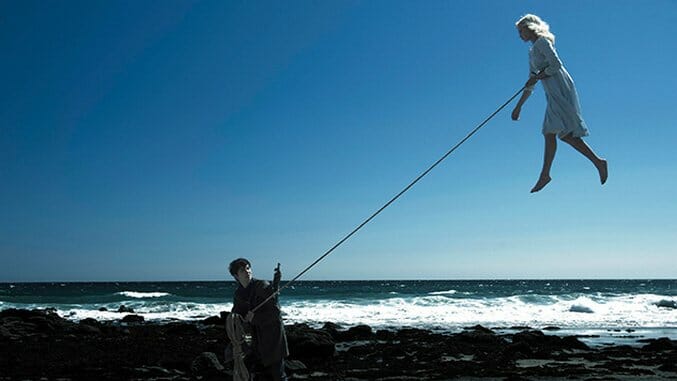Miss Peregrine’s Home for Peculiar Children

Miss Peregrine’s Home for Peculiar Children, an adaptation of the popular young adult novel, arrives with both the burden of wearing its many influences on its sleeve, and then having to transcend them. With a little X-Men here, a sprinkling of Harry Potter there, the film treads in opulent fantasy and themes that are the stuff of sturdy all-ages drama: the battle between good and evil, say, or the struggle of the different against the oppressive and mundane. In fact, director Tim Burton would seem well-suited to this material. Embracing throughout his career the strange, the disaffected, and the outcast—all of which apply here.
Miss Peregrine’s Home for Peculiar Children’s opening sequence finds Burton upending the suburban, sunbaked blandness of south Florida with the menace of a faceless monster and an old man so hysterically in fear for his life, he calls upon his teenage grandson Jake (Asa Butterfield) for help. The outcome of that plea compels Jake to visit an island off the coast of Wales and find the orphanage in which his grandfather (Terence Stamp) took refuge during World War II. Though it had been destroyed during a bombing raid, some fortuitous time travel returns Jake to the time when the vine-covered chateau stood proud amidst its gorgeous gardens and topiaries. It’s here that Burton efficiently introduces each of the peculiar children, whose powers are refreshingly more oddball than awe inspiring (one boy is like a human hive for bees; a girl can grow plant life at will), while a couple of others have the more stock abilities of invisibility and strength. One in particular, Horace (Hayden Keeler-Stone), with his elongated nose, observant eyes and sharp features, looks like he emerged fully formed from the pages of a classic children’s storybook. He’s a boy of dandy sartorial style, his taste for fine clothing surpassed only by the wondrous ability to shine dreams from his eye onto a projection screen for an evening’s entertainment.
The protective headmistress keeping them all in tow is Miss Peregrine (Eva Green), who can transform into her namesake bird and sports a long black coat and blue-streaked hair swept into waves atop her head. Green plays Peregrine as forthright and cheerful, someone who cuts a regal figure and commands respect while being accessible and loving. Among her duties, she must stand outside the home at the same time each night, waiting for the German bombers to arrive, and literally wind back her clock to prevent disaster. But despite being in this time loop, neither Miss Peregrine nor her children are safe from the evil desires of Barron (Samuel L. Jackson), who will stop at nothing to achieve immortality—and that includes killing all those with powers like Peregrine. Unfortunately, Barron’s plan ends up being hardly that involved or inventive, and the finale it precipitates is under-imagined.
-

-

-

-

-

-

-

-

-

-

-

-

-

-

-

-

-

-

-

-

-

-

-

-

-

-

-

-

-

-

-

-

-

-

-

-

-

-

-

-








































